Nursing Theory: From Novice to Expert & Application to Patient Care
VerifiedAdded on 2022/09/16
|12
|1064
|15
Presentation
AI Summary
This presentation provides an in-depth analysis of Patricia Benner's 'From Novice to Expert' nursing theory, which describes the progression of a nurse's skills and understanding through five levels of experience: novice, advanced beginner, competent, proficient, and expert. The presentation delves into the major concepts of each level, highlighting the shift from reliance on abstract principles to the application of real-world experience and intuition. It discusses the major assumptions of the theory, including the importance of experience in developing expertise and the four metaparadigms of nursing: person, health, environment, and nursing. The presentation then applies the theory to the scenario of a distressed patient, outlining a practical approach to patient care based on the principles of the theory, including how a nurse at different experience levels can provide effective care. The presentation concludes with a list of relevant references.
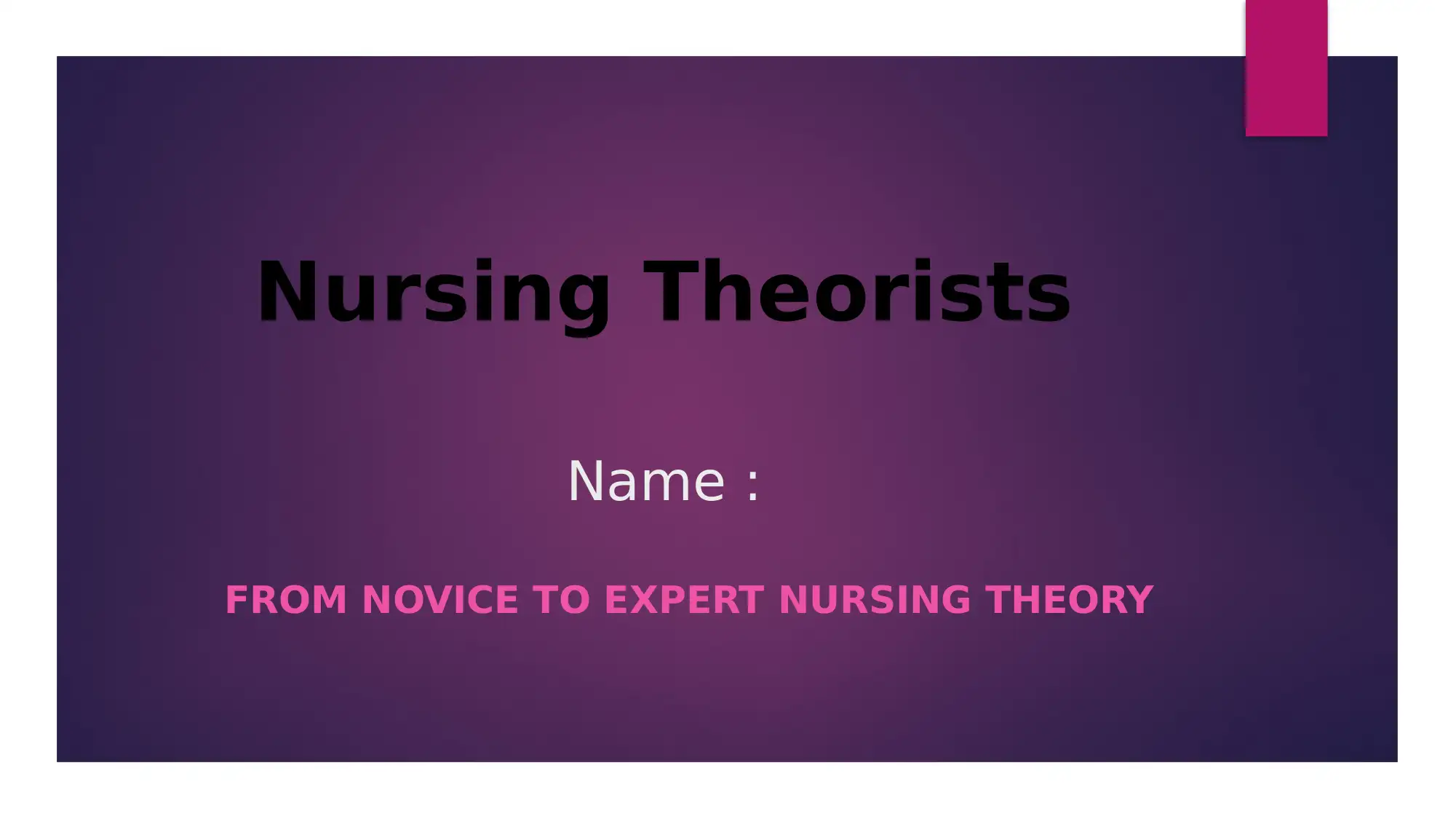
Nursing Theorists
Name :
FROM NOVICE TO EXPERT NURSING THEORY
Name :
FROM NOVICE TO EXPERT NURSING THEORY
Paraphrase This Document
Need a fresh take? Get an instant paraphrase of this document with our AI Paraphraser
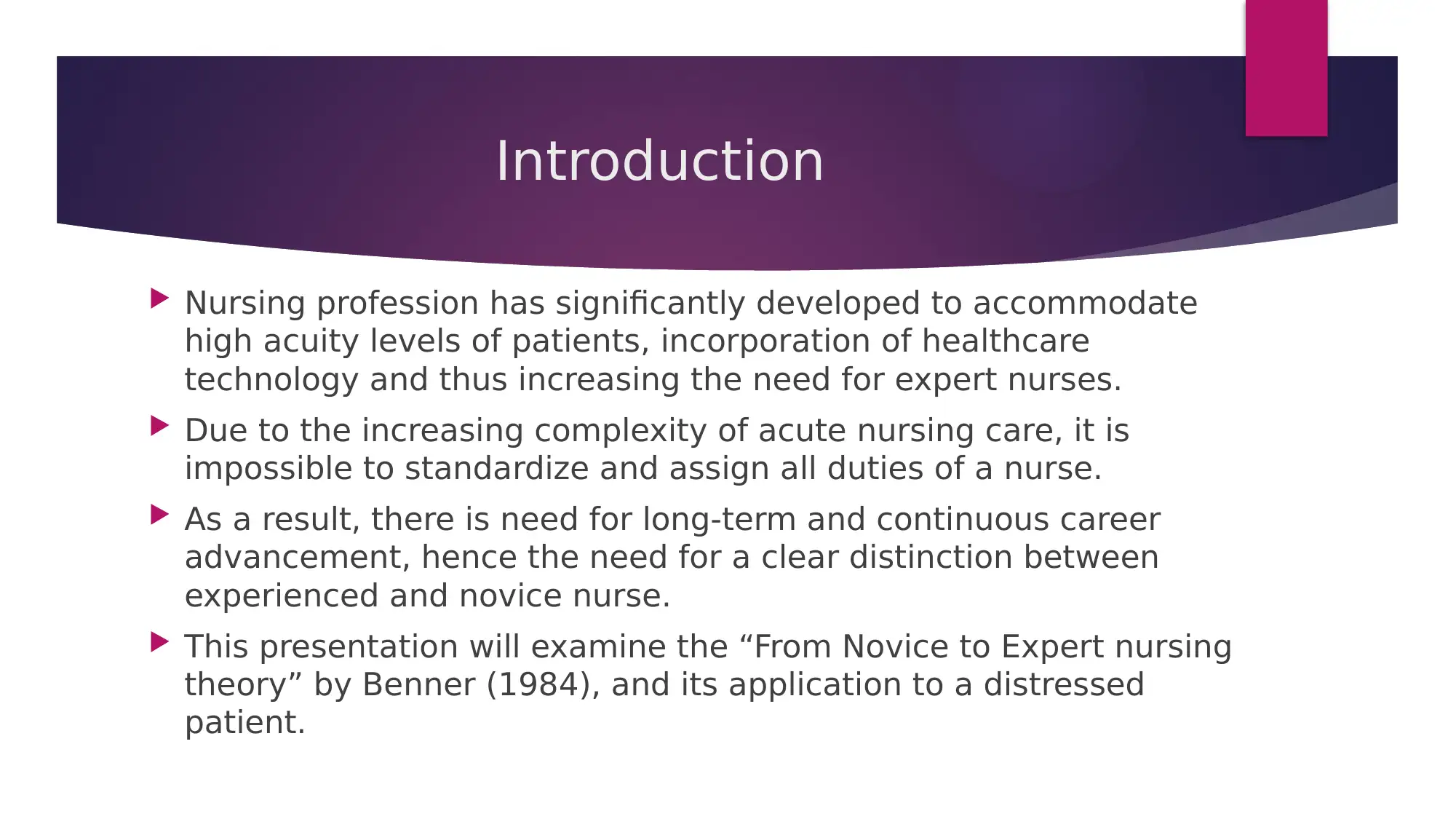
Introduction
Nursing profession has significantly developed to accommodate
high acuity levels of patients, incorporation of healthcare
technology and thus increasing the need for expert nurses.
Due to the increasing complexity of acute nursing care, it is
impossible to standardize and assign all duties of a nurse.
As a result, there is need for long-term and continuous career
advancement, hence the need for a clear distinction between
experienced and novice nurse.
This presentation will examine the “From Novice to Expert nursing
theory” by Benner (1984), and its application to a distressed
patient.
Nursing profession has significantly developed to accommodate
high acuity levels of patients, incorporation of healthcare
technology and thus increasing the need for expert nurses.
Due to the increasing complexity of acute nursing care, it is
impossible to standardize and assign all duties of a nurse.
As a result, there is need for long-term and continuous career
advancement, hence the need for a clear distinction between
experienced and novice nurse.
This presentation will examine the “From Novice to Expert nursing
theory” by Benner (1984), and its application to a distressed
patient.
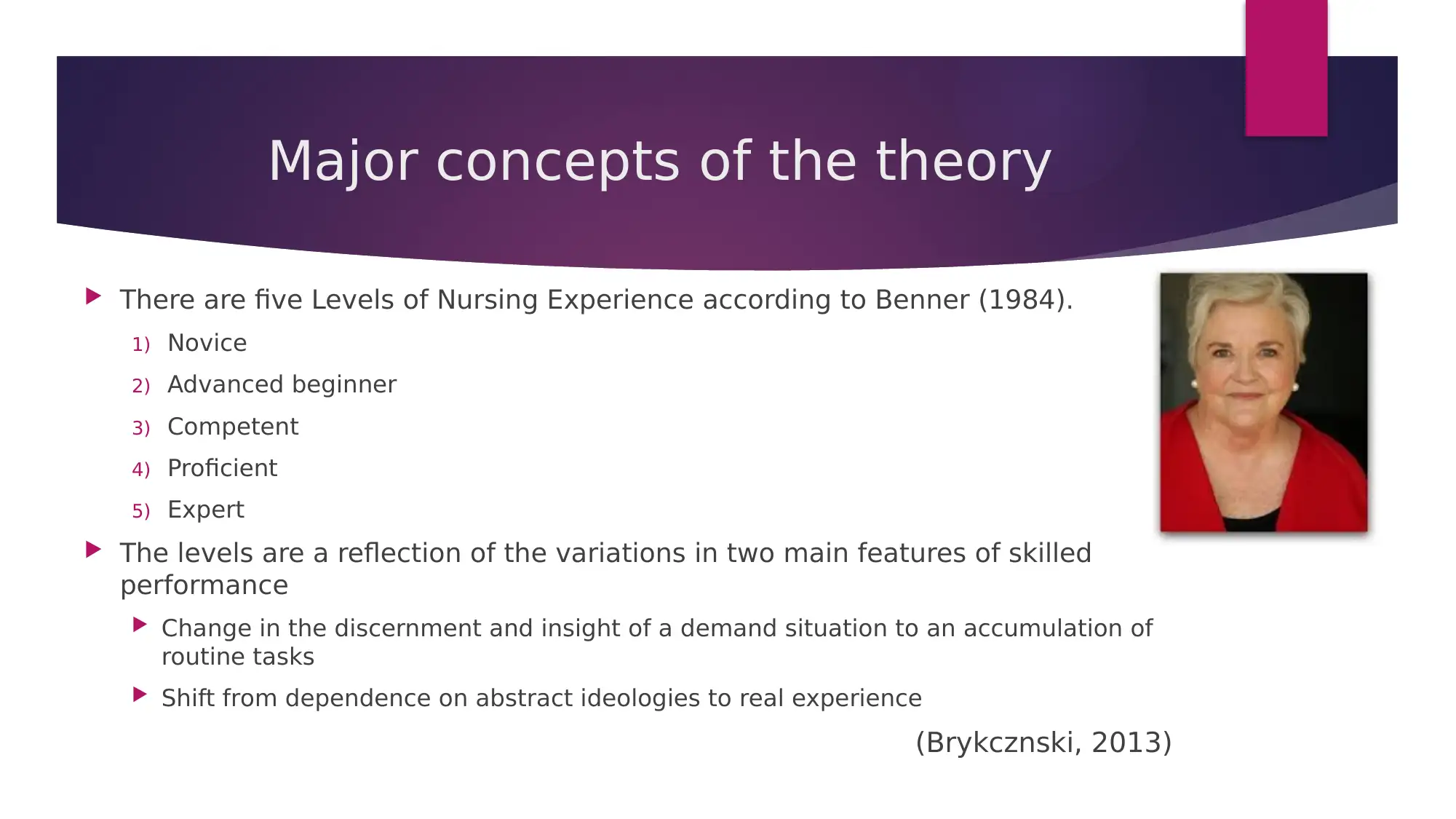
Major concepts of the theory
There are five Levels of Nursing Experience according to Benner (1984).
1) Novice
2) Advanced beginner
3) Competent
4) Proficient
5) Expert
The levels are a reflection of the variations in two main features of skilled
performance
Change in the discernment and insight of a demand situation to an accumulation of
routine tasks
Shift from dependence on abstract ideologies to real experience
(Brykcznski, 2013)
There are five Levels of Nursing Experience according to Benner (1984).
1) Novice
2) Advanced beginner
3) Competent
4) Proficient
5) Expert
The levels are a reflection of the variations in two main features of skilled
performance
Change in the discernment and insight of a demand situation to an accumulation of
routine tasks
Shift from dependence on abstract ideologies to real experience
(Brykcznski, 2013)
⊘ This is a preview!⊘
Do you want full access?
Subscribe today to unlock all pages.

Trusted by 1+ million students worldwide
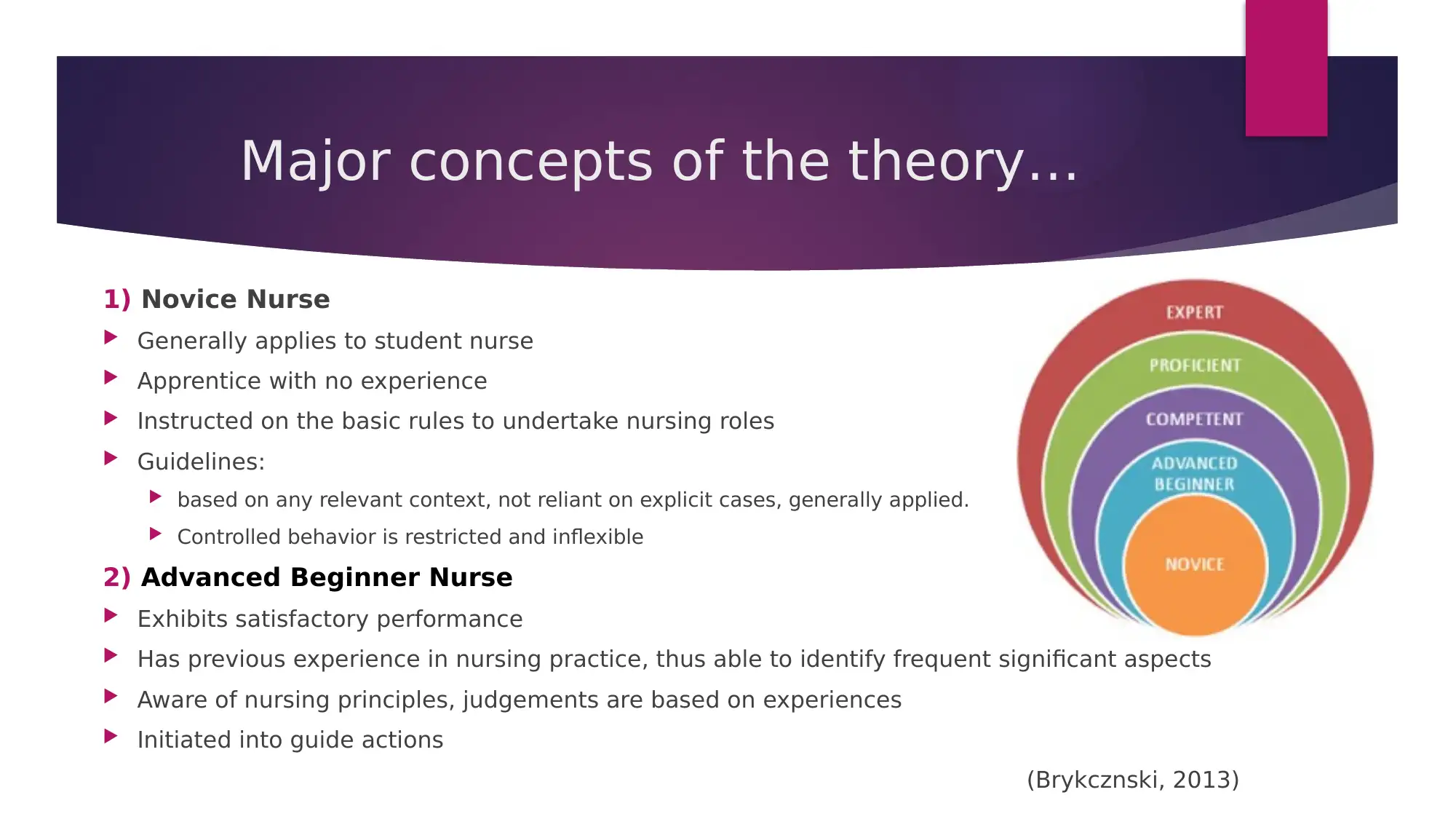
Major concepts of the theory…
1) Novice Nurse
Generally applies to student nurse
Apprentice with no experience
Instructed on the basic rules to undertake nursing roles
Guidelines:
based on any relevant context, not reliant on explicit cases, generally applied.
Controlled behavior is restricted and inflexible
2) Advanced Beginner Nurse
Exhibits satisfactory performance
Has previous experience in nursing practice, thus able to identify frequent significant aspects
Aware of nursing principles, judgements are based on experiences
Initiated into guide actions
(Brykcznski, 2013)
1) Novice Nurse
Generally applies to student nurse
Apprentice with no experience
Instructed on the basic rules to undertake nursing roles
Guidelines:
based on any relevant context, not reliant on explicit cases, generally applied.
Controlled behavior is restricted and inflexible
2) Advanced Beginner Nurse
Exhibits satisfactory performance
Has previous experience in nursing practice, thus able to identify frequent significant aspects
Aware of nursing principles, judgements are based on experiences
Initiated into guide actions
(Brykcznski, 2013)
Paraphrase This Document
Need a fresh take? Get an instant paraphrase of this document with our AI Paraphraser
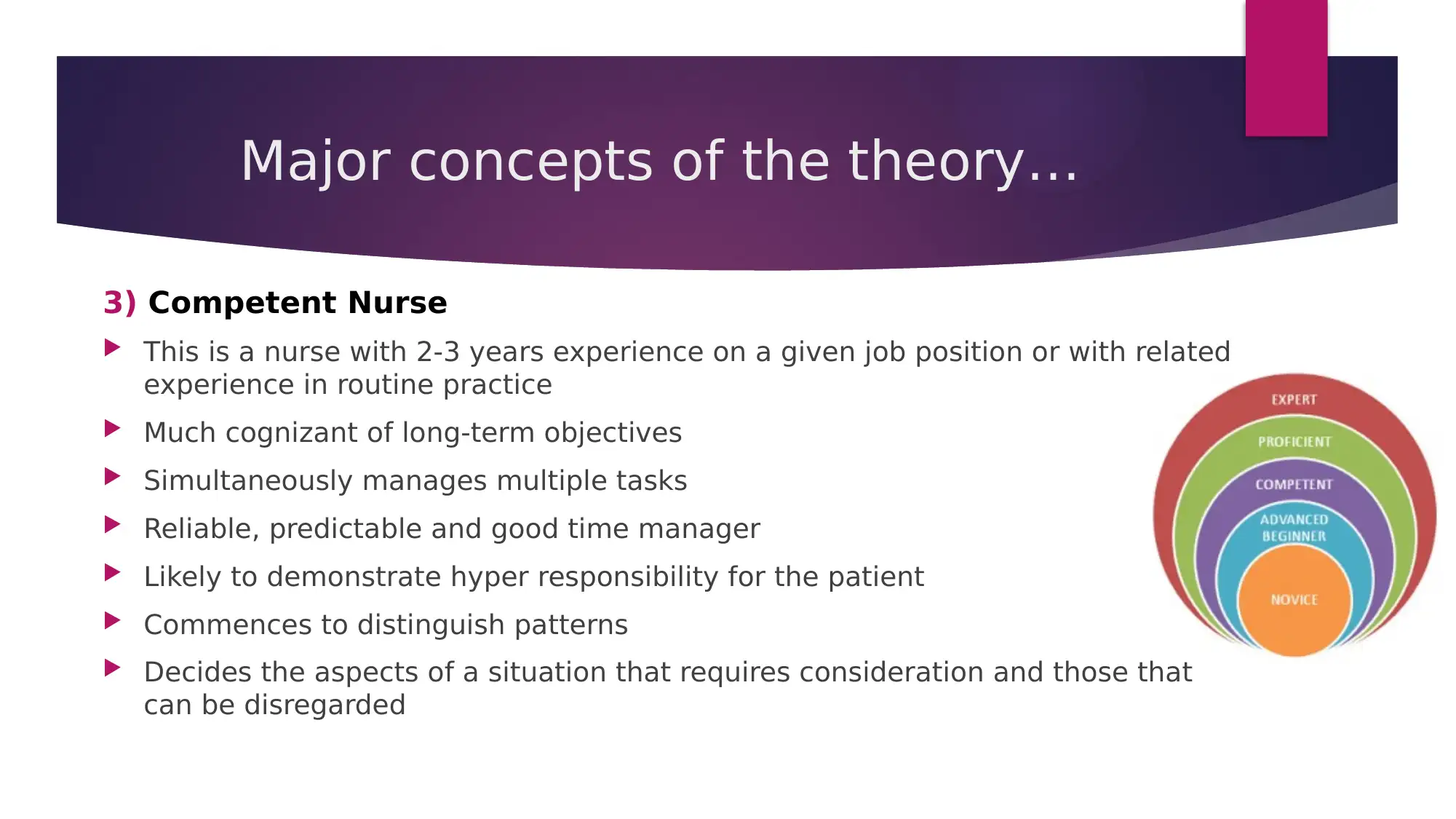
Major concepts of the theory…
3) Competent Nurse
This is a nurse with 2-3 years experience on a given job position or with related
experience in routine practice
Much cognizant of long-term objectives
Simultaneously manages multiple tasks
Reliable, predictable and good time manager
Likely to demonstrate hyper responsibility for the patient
Commences to distinguish patterns
Decides the aspects of a situation that requires consideration and those that
can be disregarded
3) Competent Nurse
This is a nurse with 2-3 years experience on a given job position or with related
experience in routine practice
Much cognizant of long-term objectives
Simultaneously manages multiple tasks
Reliable, predictable and good time manager
Likely to demonstrate hyper responsibility for the patient
Commences to distinguish patterns
Decides the aspects of a situation that requires consideration and those that
can be disregarded
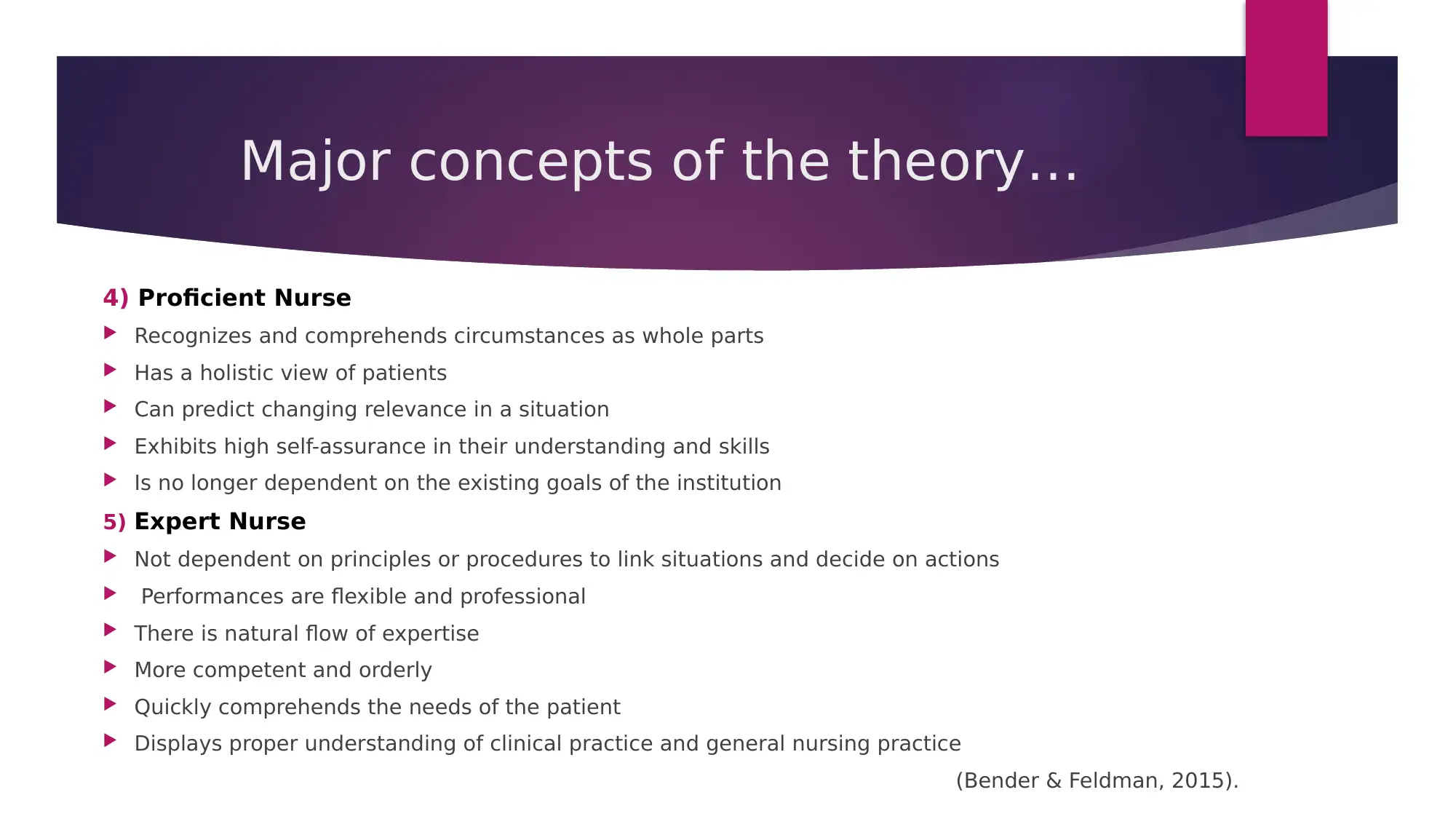
Major concepts of the theory…
4) Proficient Nurse
Recognizes and comprehends circumstances as whole parts
Has a holistic view of patients
Can predict changing relevance in a situation
Exhibits high self-assurance in their understanding and skills
Is no longer dependent on the existing goals of the institution
5) Expert Nurse
Not dependent on principles or procedures to link situations and decide on actions
Performances are flexible and professional
There is natural flow of expertise
More competent and orderly
Quickly comprehends the needs of the patient
Displays proper understanding of clinical practice and general nursing practice
(Bender & Feldman, 2015).
4) Proficient Nurse
Recognizes and comprehends circumstances as whole parts
Has a holistic view of patients
Can predict changing relevance in a situation
Exhibits high self-assurance in their understanding and skills
Is no longer dependent on the existing goals of the institution
5) Expert Nurse
Not dependent on principles or procedures to link situations and decide on actions
Performances are flexible and professional
There is natural flow of expertise
More competent and orderly
Quickly comprehends the needs of the patient
Displays proper understanding of clinical practice and general nursing practice
(Bender & Feldman, 2015).
⊘ This is a preview!⊘
Do you want full access?
Subscribe today to unlock all pages.

Trusted by 1+ million students worldwide
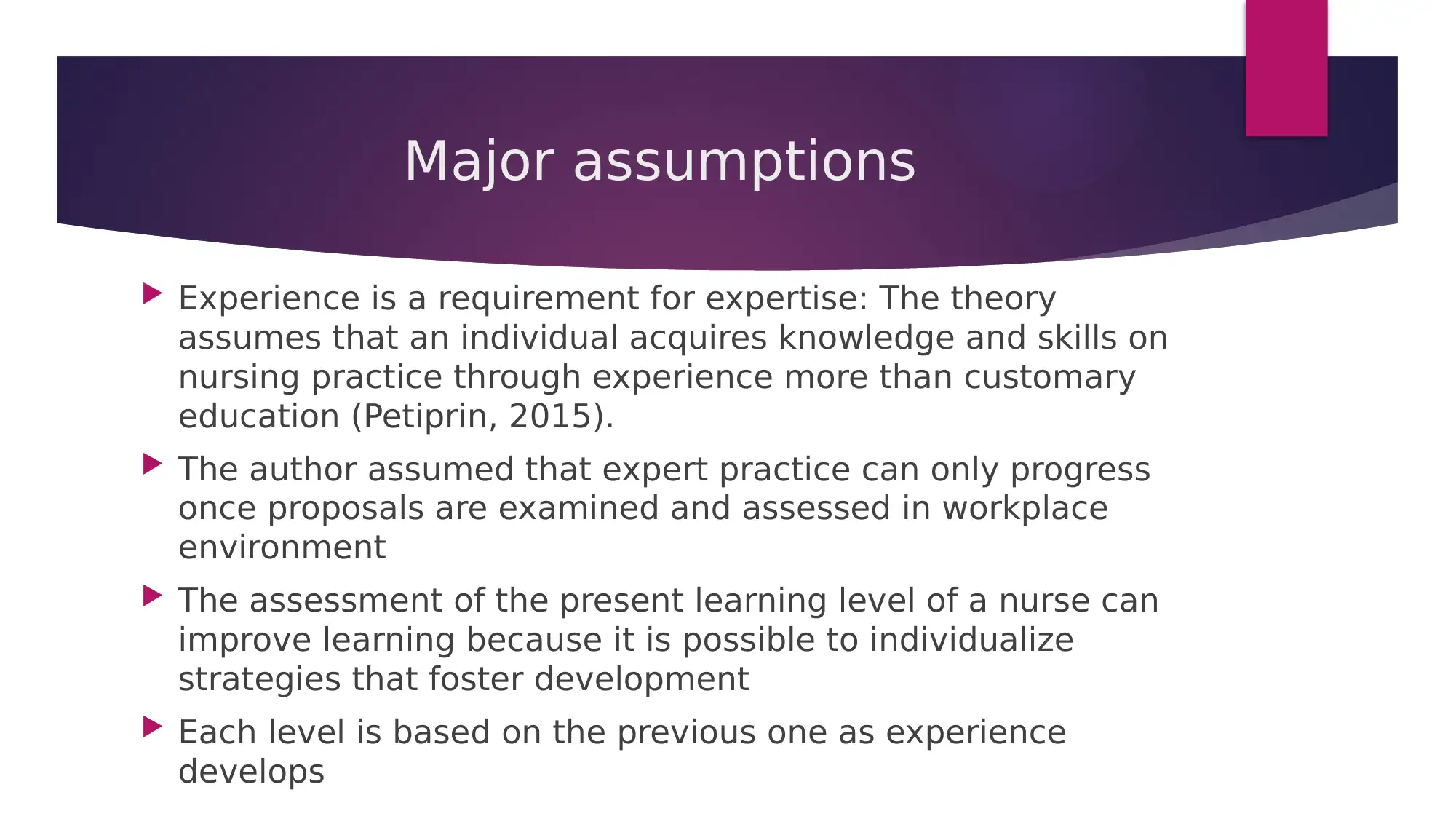
Major assumptions
Experience is a requirement for expertise: The theory
assumes that an individual acquires knowledge and skills on
nursing practice through experience more than customary
education (Petiprin, 2015).
The author assumed that expert practice can only progress
once proposals are examined and assessed in workplace
environment
The assessment of the present learning level of a nurse can
improve learning because it is possible to individualize
strategies that foster development
Each level is based on the previous one as experience
develops
Experience is a requirement for expertise: The theory
assumes that an individual acquires knowledge and skills on
nursing practice through experience more than customary
education (Petiprin, 2015).
The author assumed that expert practice can only progress
once proposals are examined and assessed in workplace
environment
The assessment of the present learning level of a nurse can
improve learning because it is possible to individualize
strategies that foster development
Each level is based on the previous one as experience
develops
Paraphrase This Document
Need a fresh take? Get an instant paraphrase of this document with our AI Paraphraser
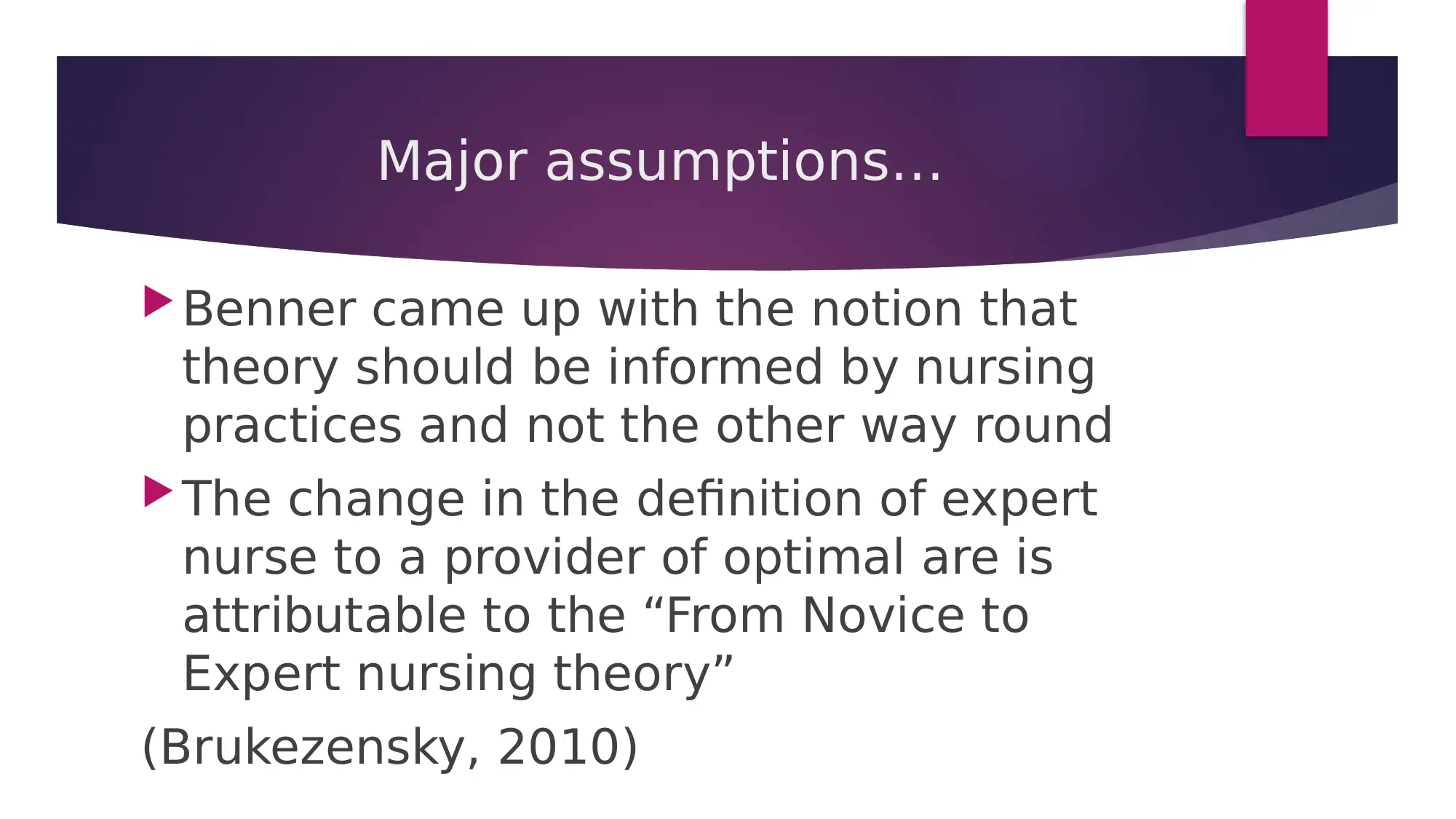
Major assumptions…
Benner came up with the notion that
theory should be informed by nursing
practices and not the other way round
The change in the definition of expert
nurse to a provider of optimal are is
attributable to the “From Novice to
Expert nursing theory”
(Brukezensky, 2010)
Benner came up with the notion that
theory should be informed by nursing
practices and not the other way round
The change in the definition of expert
nurse to a provider of optimal are is
attributable to the “From Novice to
Expert nursing theory”
(Brukezensky, 2010)
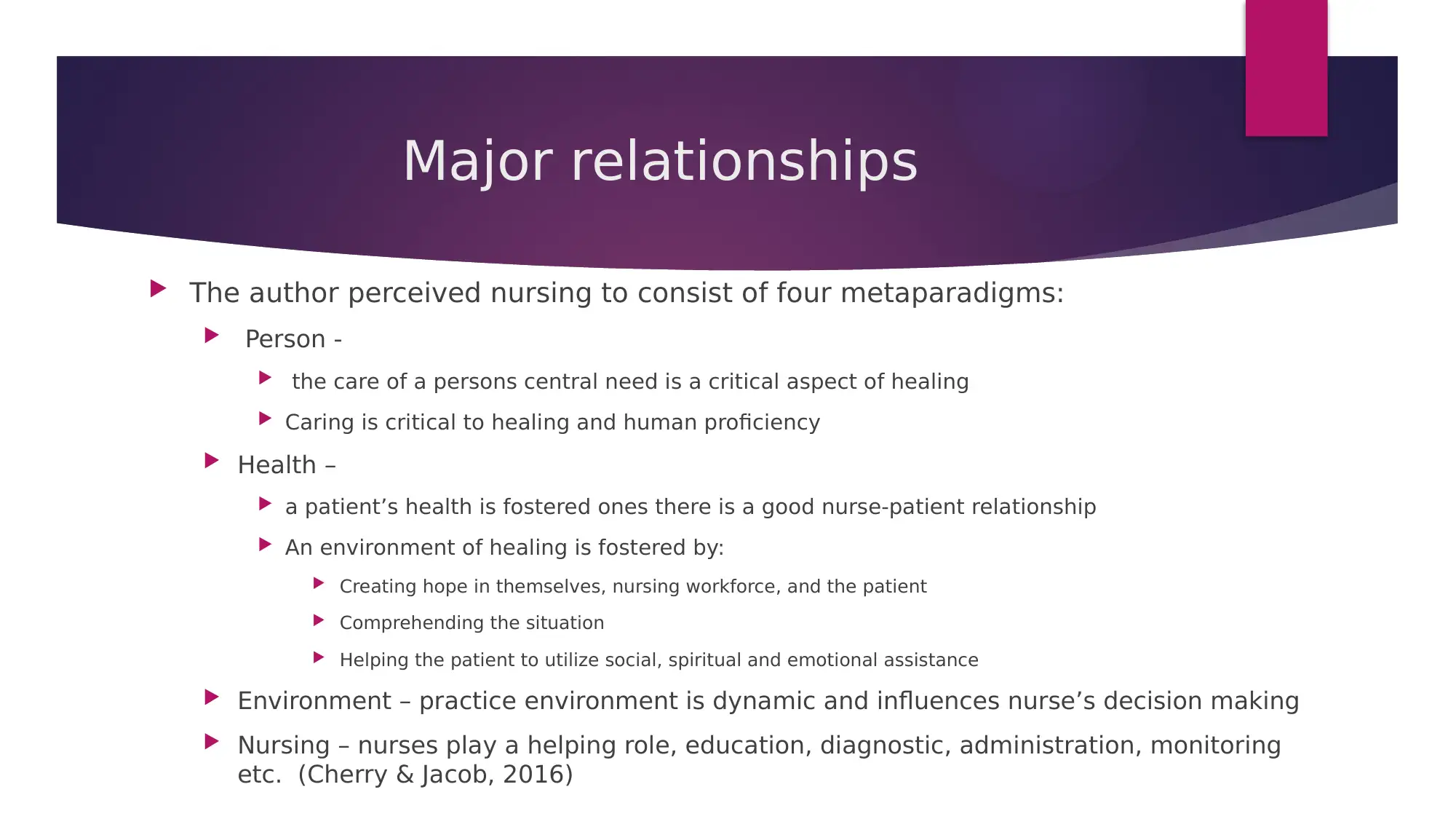
Major relationships
The author perceived nursing to consist of four metaparadigms:
Person -
the care of a persons central need is a critical aspect of healing
Caring is critical to healing and human proficiency
Health –
a patient’s health is fostered ones there is a good nurse-patient relationship
An environment of healing is fostered by:
Creating hope in themselves, nursing workforce, and the patient
Comprehending the situation
Helping the patient to utilize social, spiritual and emotional assistance
Environment – practice environment is dynamic and influences nurse’s decision making
Nursing – nurses play a helping role, education, diagnostic, administration, monitoring
etc. (Cherry & Jacob, 2016)
The author perceived nursing to consist of four metaparadigms:
Person -
the care of a persons central need is a critical aspect of healing
Caring is critical to healing and human proficiency
Health –
a patient’s health is fostered ones there is a good nurse-patient relationship
An environment of healing is fostered by:
Creating hope in themselves, nursing workforce, and the patient
Comprehending the situation
Helping the patient to utilize social, spiritual and emotional assistance
Environment – practice environment is dynamic and influences nurse’s decision making
Nursing – nurses play a helping role, education, diagnostic, administration, monitoring
etc. (Cherry & Jacob, 2016)
⊘ This is a preview!⊘
Do you want full access?
Subscribe today to unlock all pages.

Trusted by 1+ million students worldwide
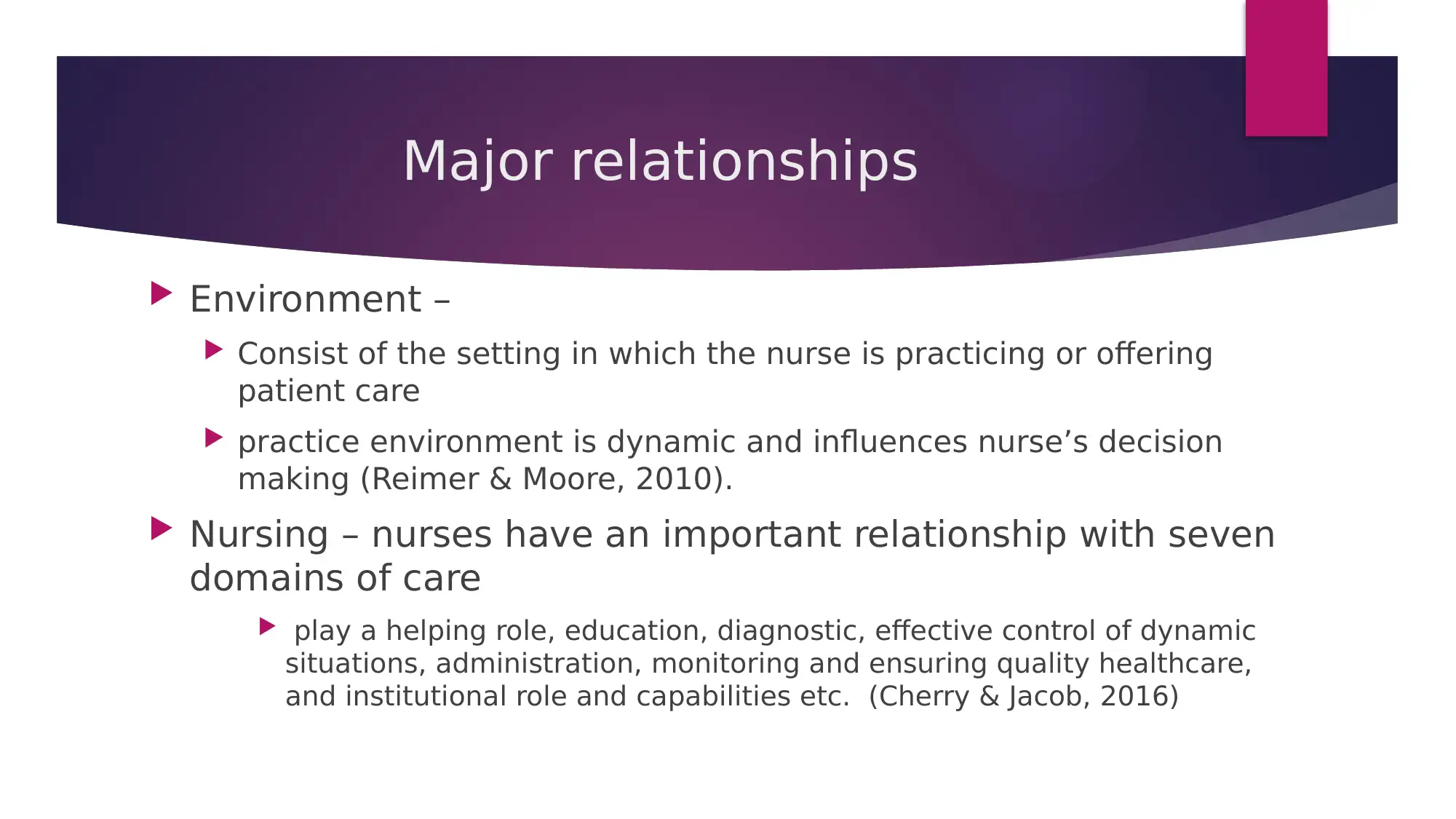
Major relationships
Environment –
Consist of the setting in which the nurse is practicing or offering
patient care
practice environment is dynamic and influences nurse’s decision
making (Reimer & Moore, 2010).
Nursing – nurses have an important relationship with seven
domains of care
play a helping role, education, diagnostic, effective control of dynamic
situations, administration, monitoring and ensuring quality healthcare,
and institutional role and capabilities etc. (Cherry & Jacob, 2016)
Environment –
Consist of the setting in which the nurse is practicing or offering
patient care
practice environment is dynamic and influences nurse’s decision
making (Reimer & Moore, 2010).
Nursing – nurses have an important relationship with seven
domains of care
play a helping role, education, diagnostic, effective control of dynamic
situations, administration, monitoring and ensuring quality healthcare,
and institutional role and capabilities etc. (Cherry & Jacob, 2016)
Paraphrase This Document
Need a fresh take? Get an instant paraphrase of this document with our AI Paraphraser
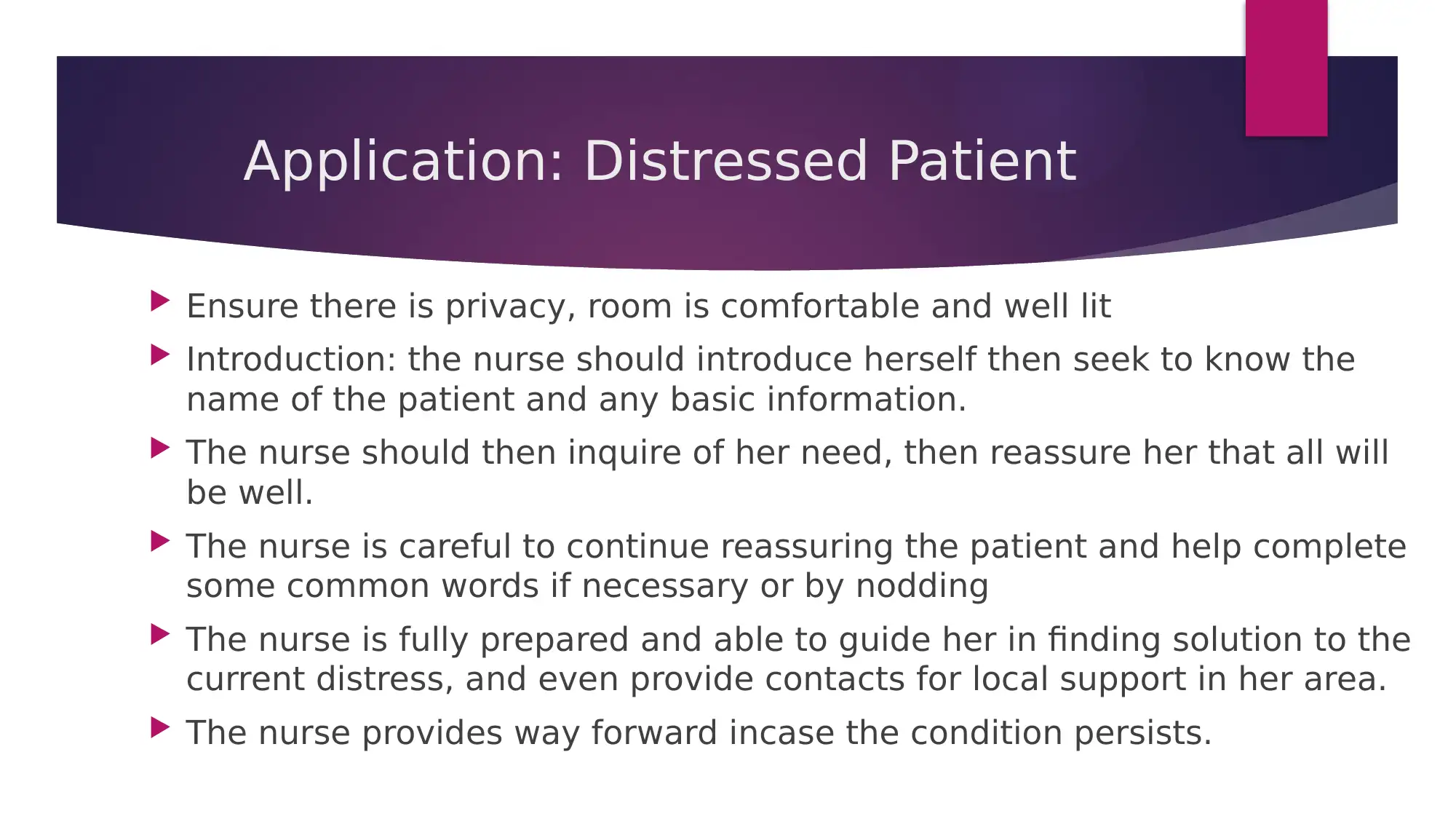
Application: Distressed Patient
Ensure there is privacy, room is comfortable and well lit
Introduction: the nurse should introduce herself then seek to know the
name of the patient and any basic information.
The nurse should then inquire of her need, then reassure her that all will
be well.
The nurse is careful to continue reassuring the patient and help complete
some common words if necessary or by nodding
The nurse is fully prepared and able to guide her in finding solution to the
current distress, and even provide contacts for local support in her area.
The nurse provides way forward incase the condition persists.
Ensure there is privacy, room is comfortable and well lit
Introduction: the nurse should introduce herself then seek to know the
name of the patient and any basic information.
The nurse should then inquire of her need, then reassure her that all will
be well.
The nurse is careful to continue reassuring the patient and help complete
some common words if necessary or by nodding
The nurse is fully prepared and able to guide her in finding solution to the
current distress, and even provide contacts for local support in her area.
The nurse provides way forward incase the condition persists.
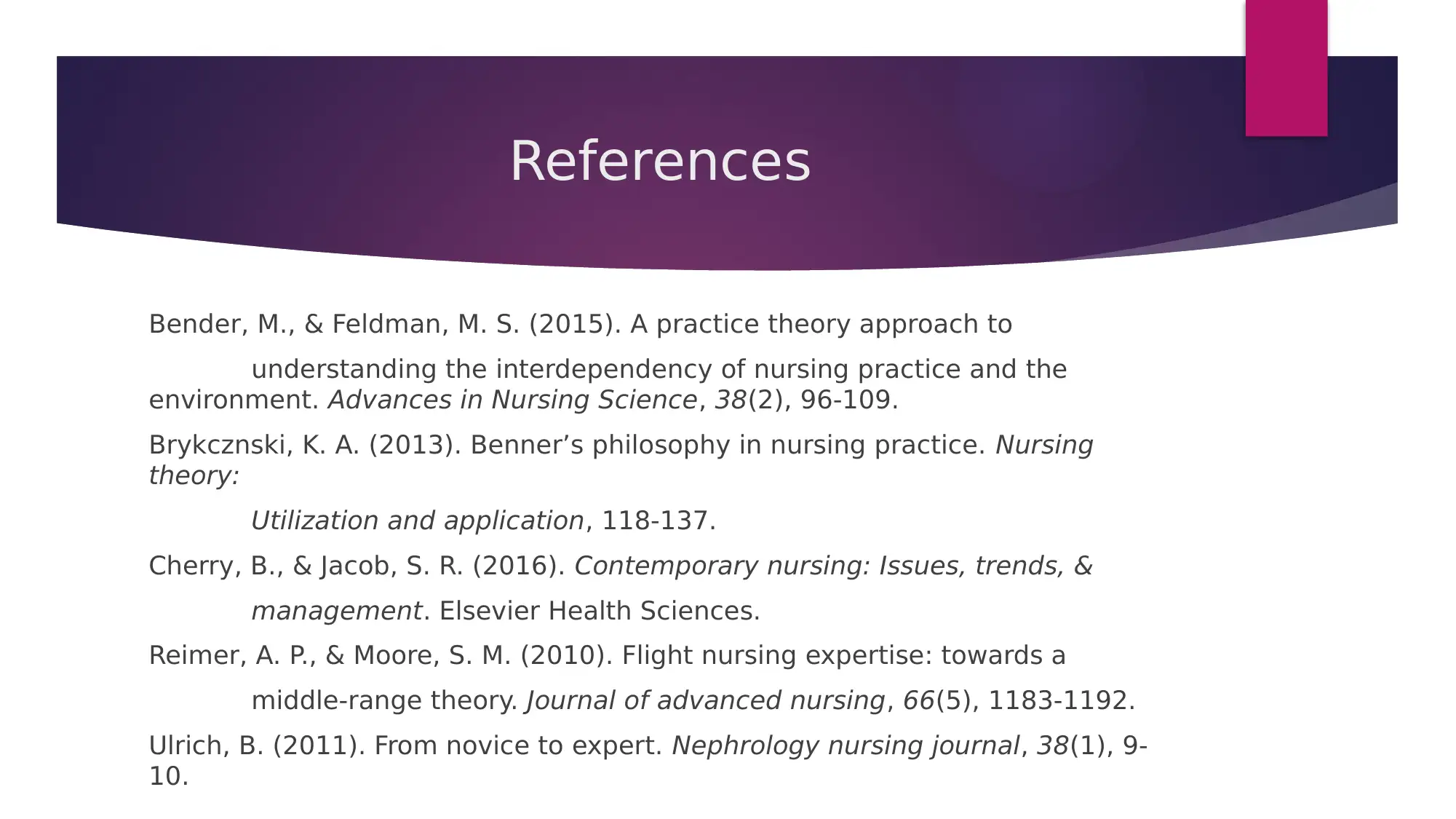
References
Bender, M., & Feldman, M. S. (2015). A practice theory approach to
understanding the interdependency of nursing practice and the
environment. Advances in Nursing Science, 38(2), 96-109.
Brykcznski, K. A. (2013). Benner’s philosophy in nursing practice. Nursing
theory:
Utilization and application, 118-137.
Cherry, B., & Jacob, S. R. (2016). Contemporary nursing: Issues, trends, &
management. Elsevier Health Sciences.
Reimer, A. P., & Moore, S. M. (2010). Flight nursing expertise: towards a
middle‐range theory. Journal of advanced nursing, 66(5), 1183-1192.
Ulrich, B. (2011). From novice to expert. Nephrology nursing journal, 38(1), 9-
10.
Bender, M., & Feldman, M. S. (2015). A practice theory approach to
understanding the interdependency of nursing practice and the
environment. Advances in Nursing Science, 38(2), 96-109.
Brykcznski, K. A. (2013). Benner’s philosophy in nursing practice. Nursing
theory:
Utilization and application, 118-137.
Cherry, B., & Jacob, S. R. (2016). Contemporary nursing: Issues, trends, &
management. Elsevier Health Sciences.
Reimer, A. P., & Moore, S. M. (2010). Flight nursing expertise: towards a
middle‐range theory. Journal of advanced nursing, 66(5), 1183-1192.
Ulrich, B. (2011). From novice to expert. Nephrology nursing journal, 38(1), 9-
10.
⊘ This is a preview!⊘
Do you want full access?
Subscribe today to unlock all pages.

Trusted by 1+ million students worldwide
1 out of 12
Related Documents
Your All-in-One AI-Powered Toolkit for Academic Success.
+13062052269
info@desklib.com
Available 24*7 on WhatsApp / Email
![[object Object]](/_next/static/media/star-bottom.7253800d.svg)
Unlock your academic potential
Copyright © 2020–2026 A2Z Services. All Rights Reserved. Developed and managed by ZUCOL.





